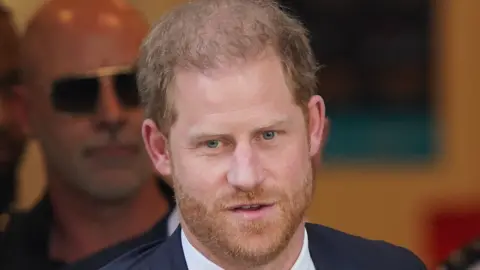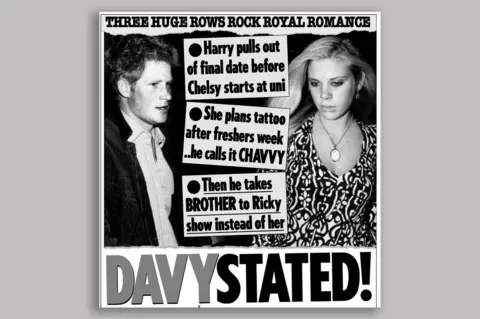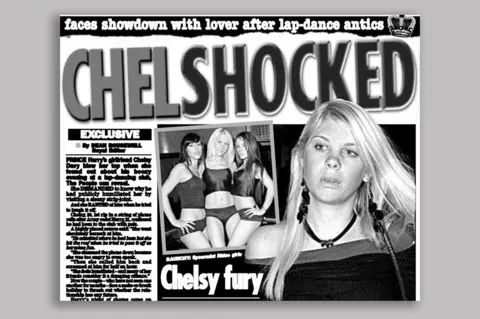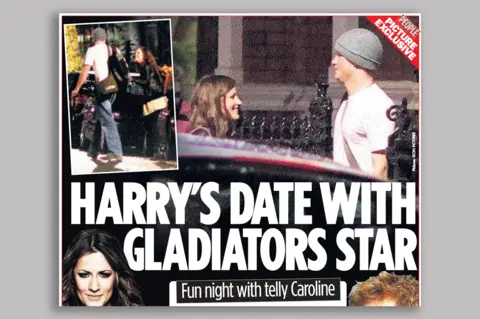Prince Harry's claims and how they were challenged
 PA Media
PA MediaFor two days Prince Harry has faced intense cross-examination in the witness box at the High Court, making him the first senior royal to give evidence in a law court in 132 years.
His appearance has focused on 33 sample articles from the Daily Mirror, Sunday Mirror and The People newspapers which he claims were obtained through unlawful information gathering, including phone hacking.
Mirror Group Newspapers denies phone hacking in this case, and Harry's evidence has been challenged by the publisher's barrister, Andrew Green KC.
Here are some of the exchanges from the past two days in court:
'I never shared relationship details with Palace'
Among the articles Harry claims were linked to phone hacking is an article in The People from September 2007 which reported details of his alleged troubled relationship with Chelsy Davy, his on-off girlfriend for six years.
"Prince Harry's romance with Chelsy Davy is in crisis after a string of bitter bust-ups," The People's article said.
In his written statement, Harry said he believed the information must have come from hacked voicemails.
"I never discussed any details with the Palace about my relationship with my girlfriend, so attributing such information to a Palace source is incredibly suspicious," Harry told the court.
He alleges everything in the article attributed to a Palace source is a result of phone hacking, because the Palace would not have known about such information.
But MGN's barrister Andrew Green said: "We are in the land of total speculation about where this information might have come from?"
"Not at all. I disagree," Harry said in response.
 Crown
Crown'Mirror journalists encouraged to get more information after strip club story'
Harry is also complaining about an April 2006 article in The People titled 'Chel shocked' which he claims is linked to phone hacking.
The article said Harry's then girlfriend Chelsy Davy "blew her top" about his "boozy" evening at a "sleazy strip joint", and included details of a phone call between the pair.
MGN barrister Andrew Green argued that the story about his trip had already been reported in other publications, namely the Daily Mail.
But in response, Harry said the Mirror was encouraged to look for further information about it.
"In so far as the article in The People of which you complain raises the fact that Ms Davy was angry, it was not adding anything in substance that had not been implied in other articles?" Green asked.
Harry replied: "That's a classic example where a story originates from a different paper and then the Mirror or another paper - which is one step behind - is encouraged to go out and get extra information."
This was a common theme throughout Harry's cross-examination - whenever it was put to him that the information had already been reported before the Mirror papers got to it, Harry in turn claimed it encouraged MGN journalists to use unlawful techniques to find new angles.
 Crown
CrownWas Eton story nothing but a trifle?
September 2002 - and the Daily Mirror reports there's "No Eton trifles for Harry", revealing his 18th birthday had been a bit of a damp squib because he spent the evening travelling back to school from his father's estate.
The story said he'd had lunch with brother William and had received a set of golf clubs from his late mother's brother, Earl Spencer. In his witness statement he said it had been an ideal occasion for him to be targeted by journalists looking for private information.
But the Mirror's barrister told the court the story could be sourced to an interview the prince had agreed to do with the Press Association - and asked him if there was anything in the story that could have come from voicemail interception, rather than the interview.
"Did you look back at the interview before signing off your witness statement," asked Andrew Green.
"No," said Prince Harry.
As he took the duke through the interview, he said he could "see the similarities" with the Mirror story.
"Do you still maintain that the Daily Mirror article revealed private information without your consent," asked the barrister.
"I believe the article was connected to an invoice," said Prince Harry.
"And so what?"
"The timing is suspicious."
"So what you're suggesting is that although the exact same information was released by you in an interview and appeared in other articles, you think that what happened was [the Mirror's royal editor] hacked your phone to try and get additional information?"
"Based on the legal team and what I've seen, yes."
- Some readers may find language in the next section offensive
Did Harry want to meet his mother's former butler or not?
In another exchange, Prince Harry was quizzed on differing accounts in his witness statement and in his memoir Spare.
A story in The People in 2003, which is part of his case, revealed a private disagreement between him and his brother about how to handle Paul Burrell, their mother's former butler.
In his witness statement, the prince said he did not want to meet Burrell, but in his book Spare he said he did.
Asked by Andrew Green to clarify his position, the duke replied: "I can't remember whether I wanted a meeting with him or not."
In the newspaper article, Prince Harry is quoted as calling Mr Burrell a "two-faced shit" - he says journalists may have got that from a voicemail interception.
He told Mr Green he could not recall leaving a specific voicemail message for his brother using that language because of the passage of time between now and then, but added: "I was leaving voicemails for my brother, and that is a terminology I used describing Mr Burrell, yeah."
The barrister suggested there were sources talking about this story within the Royal Household.
The Evening Standard's royal correspondent Robert Jobson for one seemed to have spoken to them.
"I wouldn't necessarily call them sources," Prince Harry responds. "Based on a lot of what he's written, they may be imaginary sources."
How did photographers know about Caroline Flack dinner party ?
 Crown
CrownPrince Harry particularly remembered one article in The People about a dinner party date with the late TV presenter Caroline Flack - an event he said had left him "shocked" and "livid".
In April 2009 Harry and Ms Flack arranged to meet at the London home of his close confidante Mark, or Marko, Dyer.
The Duke recalled he discreetly left his Army training in Lincolnshire and when he got to Marko's, paparazzi from the picture agency IKON were hiding underneath a car.
"There's no way I could have been followed. Only Marko, Caroline and I knew of the plans," he said.
Team Harry asked how The People could have known, given the secrecy surrounding the meet-up.
But Andrew Green, for the Mirror Group, hit back saying The People paid IKON £2,500 for the story - suggesting its journalists had no direct involvement in any part of the newsgathering.
"Would you agree that if the journalist at The People had known about this story from phone hacking, they wouldn't have paid £2,500 to a journalist for this material?" he asked.
Harry replied: "The story makes it very clear the photographers were there before I got there, they saw me arriving. The evening was specifically between me [and] Caroline who is no longer with us."
Crucial final questions from the judge?
After the back and forth between Prince Harry and the Mr Green, the judge had some questions for Prince Harry.
Judges don't always intervene in the examination of a witness - but when they do, it often leads to courtroom speculation about what they are thinking.
Mr Justice Fancourt could have asked Prince Harry anything, but at the end of his evidence, he was particularly interested in a completely-overlooked part of his witness statement in which he says he recalls memories of the tell-tale signs of voicemail interception.
Over those four paragraphs of his statement, Prince Harry says he remembers voice messages on his phone would appear not to be new, even if he had not listened to them, or the icon for a new message would disappear from his screen before he had had a chance to access the inbox.
There is no dispute that phone hacking techniques then used by journalists could lead to messages disappearing this way.
"Can you help by identifying when... you experienced this strange activity?" asked the judge.
"From the moment I had a mobile phone," replied Prince Harry, meaning around the time he went to Eton College in 1998.
"Are you saying this continued throughout the period?"
"It never stopped," said Prince Harry, before detailing his anecdotal recollections of friends asking why he had missed voicemails.
Is this exchange important? Well, it could be.
The judge was asking Prince Harry about something in his personal knowledge and experience, after hours of allegations that the Mirror Group had said were speculative and unsupportable.
The Judge's assessment of the Duke's credibility on this answer may become important in his conclusions about whether he might have been targeted, even if there is no paper trail to prove it conclusively.
